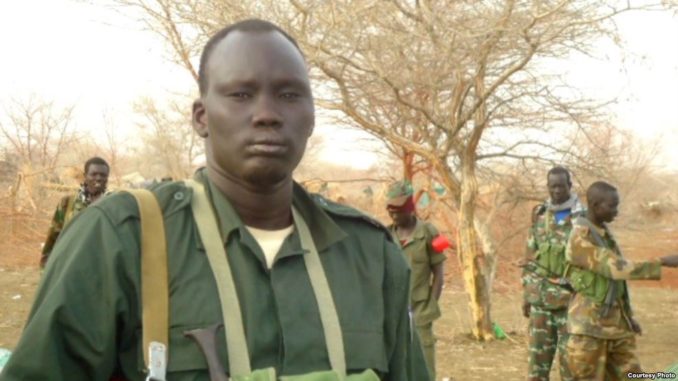
JUBA, SOUTH SUDAN — Officials of the South Sudan Democratic Movement/Cobra Faction, formerly led by David Yau Yau, have vowed to wage war again against the government of President Salva Kiir because it allegedly has not lived up to its side of a peace agreement signed in 2014.
Yau Yau signed the peace deal with Kiir in May 2014, which granted the Greater Pibor area a semiautonomous administrative status. But current SSDM/Cobra Faction leaders say the Kiir administration has abandoned just about all other provisions of the deal.
When the peace deal was signed, Yau Yau was appointed deputy defense minister. The new SSDM/Cobra Faction leader is Lieutenant General Khalid Botrus Bora, whose spokesman, Kernoy Philip Kadal, held a news conference in Nairobi, Kenya, Tuesday to say the group would join other militants in their efforts to topple the Kiir administration.
“The SSDM/A [South Sudan Democratic Movement/Army] is announcing that it shall from today join the struggle against the authoritarian tribalistic regime in Juba. Being conscious of the need to unify the ranks of all the forces opposed to the regime, SSDM/Cobra shall immediately enter into serious dialogue with the like-minded patriotic forces already in the field of combat with the aim of cooperation, coordination or merger,” Kadal said.
The peace agreement was brokered by church leaders, led by Bishop Emeritus Paride Taban of the Roman Catholic Church. It marked an end to four years of conflict that left hundreds of people dead and destroyed property in the former Jonglei state.
The deal created the Greater Pibor Administrative Area, with a status similar to that of a state. It also created a special fund for improvement of basic services in the area, and it gave indigenous people the right to manage the land and its resources, but Kadal said the government had failed to follow through on those commitments.
Administrative roles, development
“The provisions that made people happy were not implemented,” Kadal said, citing in particular the failure to nominate Cobra Faction members to lead or administer Greater Pibor, and the failure to build roads linking Juba to the Pibor area.
He also said that “the other basic provisions, such as the schools, medical services and the other developmental things, have never materialized.”
Kadal said Yau Yau had decided to join the government and dump the agreement altogether, even though little has been achieved.
FILE – A man walks past the remains of a tank destroyed during fighting between government and rebel forces in the Jebel area of the capital, Juba, South Sudan, July 16, 2016.
Akol Paul Kordit, deputy minister of information, strongly denied the accusations.
“The allegations that the government dumped the agreement and that the agreement was never implemented are false,” Kordit said. “This has to be made clear to them — that this new phenomenon, where anyone decides to rebel, even if you are an individual, with the hope that if you rebel you will be shown in and given a public office is a bad culture.”
Kordit said Kiir also promoted some Cobra Faction forces to high-ranking positions in the Sudan People’s Liberation Army.
From the start of South Sudan’s independence, the Anyuak, Jie, Kachepo and Murle people in Jonglei sought greater autonomy from the former Jonglei state government, which was dominated by Nuer and Dinka. The resulting armed insurrections against the government eventually dispersed, then coalesced into the SSDM/A, which ultimately became dominated by Yau Yau and his Cobra Faction.
Peace talks in early 2014 led to a compromise that carved out two counties within Jonglei state to create the new semiautonomous Greater Pibor Administrative Area. But later, Kiir unilaterally decided to create 21 states out of the original 10, throwing into question the legitimacy of the Greater Pibor region.